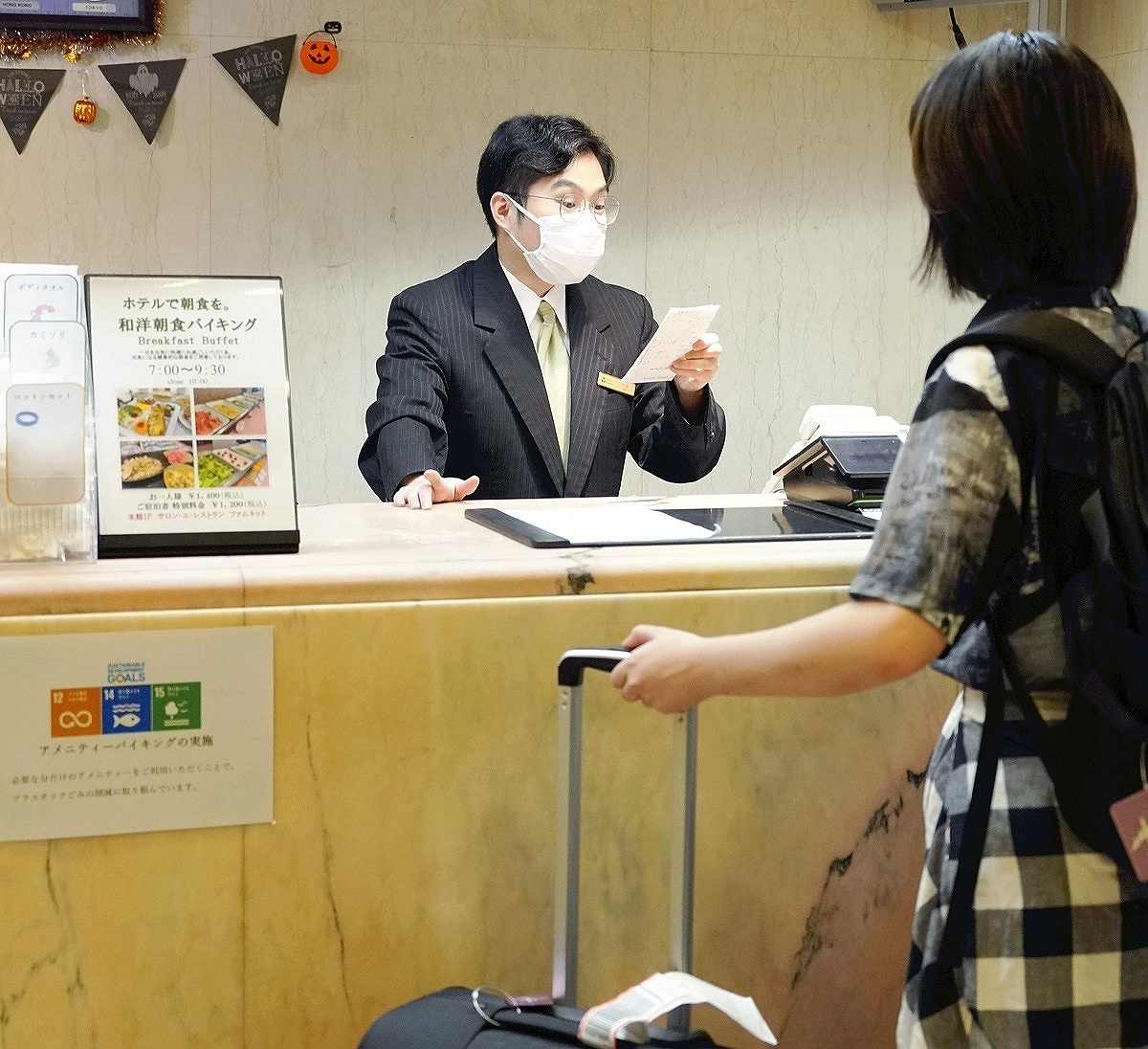Service Sector Welcomes Tokyo’s Ordinance Targeting ‘Customer Harassment’; Challenge Remains to Ensure Intended Effect

An front desk employee serves a guest at a hotel in Shinjuku Ward, Tokyo, on Thursday.
16:33 JST, October 6, 2024
The Tokyo Metropolitan Assembly’s enactment of the nation’s first ordinance banning so-called customer harassment — in which a customer harasses a worker — has been welcomed by workers plagued by customers’ unreasonable demands, but the challenge now is how to ensure the ordinance has the intended effect, as drawing a line between legitimate complaints and harassment is difficult.
“Employees are human beings just like customers. I hope this [ordinance] will lead to greater understanding among the public that customer harassment is unacceptable,” said Hirohisa Suzuki, 64, president of the company that operates Hotel Listel Shinjuku in Shinjuku Ward, Tokyo.
Employees at the hotel are often forced to spend hours apologizing to guests who, in some cases, yell at them for leaving a single hair on the floor or threaten to post their complaints on social media after finding dust behind the TV in their room.
To protect the employees, multiple people are assigned to handle customer complaints, and occasionally the hotel has had no choice but to ban the customers from entering.
“We leave cases that violate the law, such as extortion and threats, to the police, but there have been cases that don’t amount to criminal acts, such as behavior that borders on sexual harassment and aggressive requests for room changes. We have had a hard time dealing with those kinds of cases,” Suzuki said. “We hope that the ordinance will help wipe out all customer harassment.”
According to a survey released in June by UA Zensen, a labor union that covers distribution and service industries, 46.8% of 33,133 member employees said they had been harassed by customers within the past two years. About one-third of the respondents said instances of customers causing a scene was on the rise.
Many workers have been forced to leave their jobs or committed suicide due to mental or physical illnesses caused by customer harassment.
At the request of the labor community, the Tokyo metropolitan government since last autumn had been considering countermeasures to combat the issue with experts. No objections were raised about banning customer harassment, but some voiced concerns that if a customer’s legitimate demands are considered harassment, it might infringe on their rights.
In light of that concern, the metropolitan government intends to create guidelines that specify what constitutes customer harassment and present them to each industry representatives by the end of this year to ensure the ordinance has the intended effect.
“Installing security cameras and telephones with recording functions, a measure that could be effective in preventing customer harassment, is a hurdle for small and midsize companies in terms of costs,” said Hiromasa Sasaki, deputy secretary general of Tokyo Local of Japanese Trade Union Confederation and member of the metropolitan government’s study group. “It is important for the metropolitan government to provide support to businesses that implement such measures.”
Tokyo’s moves are having ripple effects on the public and private sectors. In June this year, the central government included for the first time in its Basic Policy on Economic and Fiscal Management and Reform a call to strengthen measures to combat customer harassment. The following month, an expert panel of the Health, Labor and Welfare Ministry proposed that legislation be enacted to require companies to take measures against customer harassment. In the private sector, East Japan Railway Co. (JR East), All Nippon Airways Co. and Japan Airlines Co. have drawn up plans to deal with customer harassment strictly.
“Behind customer harassment lies excessive competition among companies as well as a corporate culture in which workers who can deal with malicious complaints are recognized as being capable,” said Masayuki Kiriu, a professor at Toyo University who specializes in criminal psychology and is well versed in customer harassment. “Consumers and companies are essentially on equal footing, so the hope is that the ordinance will help consumers change their mindsets while also leading companies to eliminate their overly humble attitude toward customers.”
Top Articles in Society
-

Producer Behind Pop Group XG Arrested for Cocaine Possession
-

Man Infected with Measles Reportedly Dined at Restaurant in Tokyo Station
-

Man Infected with Measles May Have Come in Contact with Many People in Tokyo, Went to Store, Restaurant Around When Symptoms Emerged
-

Woman with Measles Visited Hospital in Tokyo Multiple Times Before Being Diagnosed with Disease
-

Australian Woman Dies After Mishap on Ski Lift in Nagano Prefecture
JN ACCESS RANKING
-

Producer Behind Pop Group XG Arrested for Cocaine Possession
-

Japan PM Takaichi’s Cabinet Resigns en Masse
-

Man Infected with Measles Reportedly Dined at Restaurant in Tokyo Station
-

Israeli Ambassador to Japan Speaks about Japan’s Role in the Reconstruction of Gaza
-

Videos Plagiarized, Reposted with False Subtitles Claiming ‘Ryukyu Belongs to China’; Anti-China False Information Also Posted in Japan























